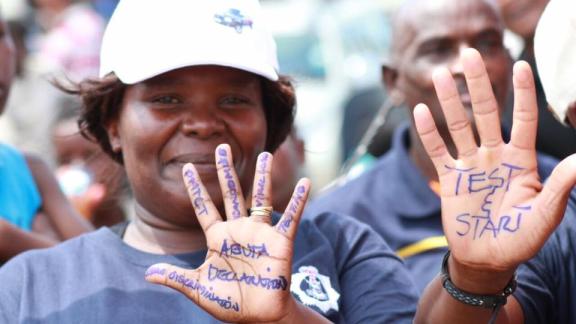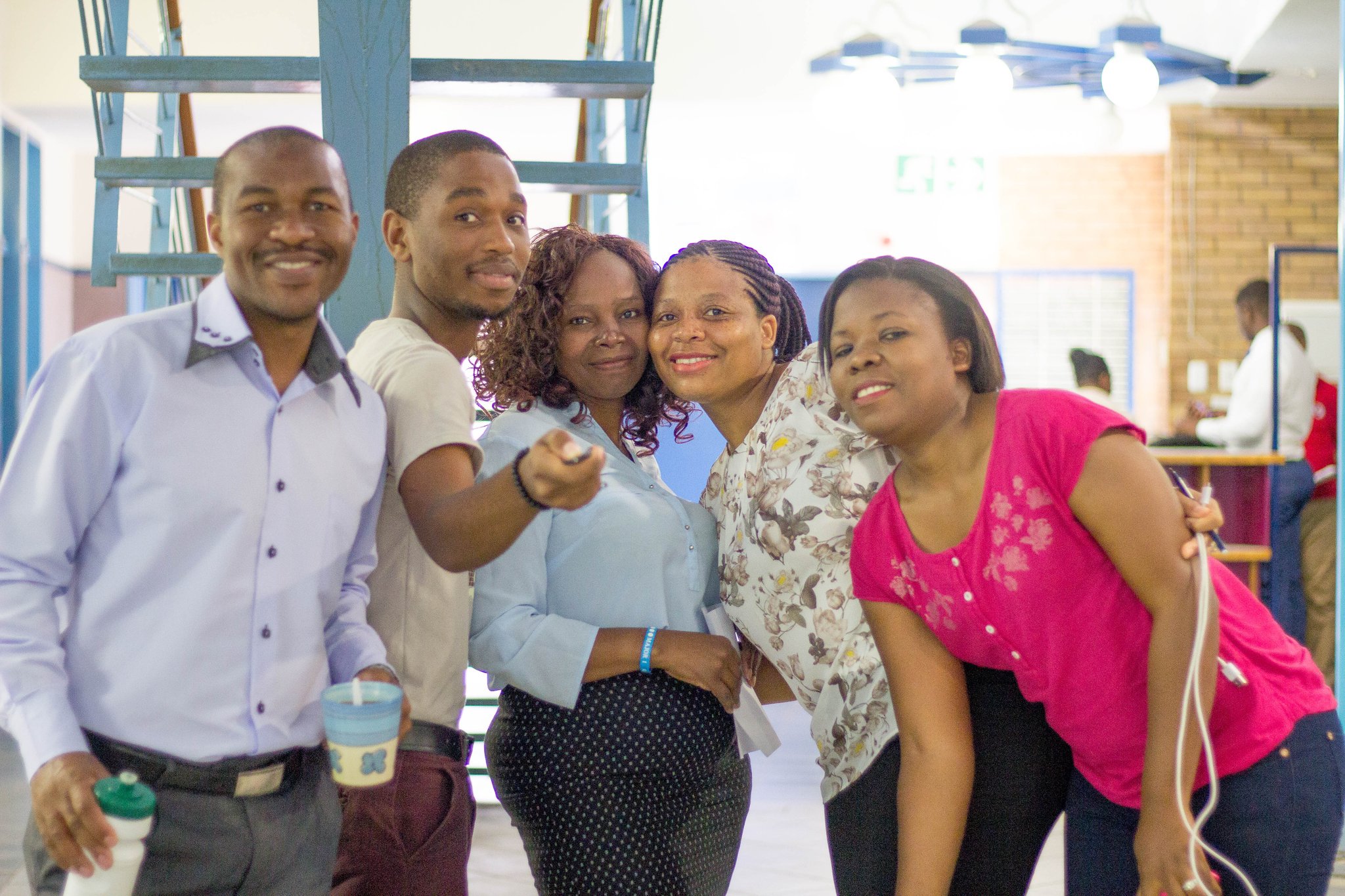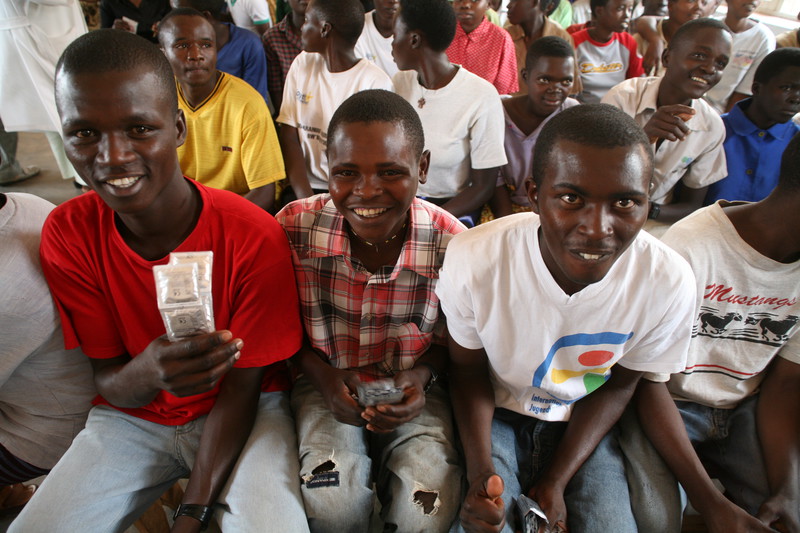Mankayane, Swaziland - On 1 December, IPPF Director General, Tewodros Melesse, made an address on the occasion of World AIDS Day in the Kingdom of Swaziland along with His Excellency the Right Honourable Deputy Prime Minister, Mr Paul Dlamini, Honourable Minister of Health Ms Sibongile Ndlela Simelane, United Nations Resident Coordinator, Mr Israel Dessalegne, and the United States of America Ambassador to Swaziland, Ms Lisa Peterson.
"It is an honour and a privilege to be commemorating World AIDS Day with you, the Swazi people. Every year, World AIDS Day provides us with the opportunity to take stock of how far we have come since the early days of the epidemic.
I’d like to begin by taking us 30 years back in time, which was 1986. That year, IBM unveiled the first laptop. Mobile phones were the size and weight of large bricks. In apartheid-era of South Africa, Nelson Mandela was behind bars; and here in Swaziland, the country recorded its first case of HIV/AIDS.
Many of you here today will agree with me when I say that, while Swaziland has not been immune to the many ways in which the world has changed over the past thirty years, it is the HIV epidemic more than anything else that has shaped this country during that time.
For those of you who have lived through the epidemic, you will remember all too well the fear and the stigma that ran through this country and many African countries. You will remember how little we knew about HIV, and about how to prevent it. People living with HIV at this time deserve to be honoured. You showed us the strength and determination to fight for change. You were brave and angry, and gave hope to others.
As I stand in front of you, I am keenly aware that there is not a single person here whose life, one way or another, has not been affected by HIV, and that all young people here today have never seen a world without HIV. The young people are the future but we have to remind ourselves that there is no future if we don’t invest in prevention.
Many of you have loved ones who were taken from this world before their time. You grieved and continue to grieve the loss of brothers, sisters, mothers, fathers, children, grandchildren, friends, colleagues, and many others. These vibrant souls, remain with us always, in our hearts and in our minds, and give us energy to continue in the future.
We can now take some comfort from the fact that the picture has changed dramatically in these past thirty years. Most significantly, people living with HIV are now living longer, healthier, and productive lives well into their old age, thanks to the availability of antiretroviral treatment that has transformed HIV infection into a chronic, manageable condition.
I would like to take this moment to commend the Government of the Kingdom of Swaziland for its commitment to providing antiretrovirals free to all who need treatment. The impact of this cannot be underestimated. AIDS-related mortality has reduced by drastically and accordingly, life expectancy has now rebounded. The transmission of HIV from mother to child is close to being eliminated along with syphilis. And overall, Swaziland has also begun to see a downward trend of new HIV infections, especially among young people.
‘Now is not the time to be complacent’
These are remarkable successes, and Swaziland has established a strong foundation. Critically, this is a foundation upon which to build - not to rest. We cannot risk becoming complacent, as HIV remains the greatest public health and socio-economic challenge facing this country.
Importantly, our response must be integrated with other key challenges. We know that there is a high unmet need for family planning, leading to high levels of unwanted pregnancy; we know that maternal and infant mortality is unacceptably high; and we know that the overall knowledge of sexual and reproductive health is exceptionally low among young people.
‘There is a serious prevention gap’
This situation is not unique to Swaziland. UNAIDS is raising the alarm about the global picture and what it calls the ‘prevention gap’. Efforts to meet the global target of ending AIDS by 2030 are off track and progress is at risk of stalling.
The global community warns that if there is a resurgence of HIV, the epidemic will be impossible to control. This cannot be allowed to happen. Primary prevention has been and will continue to be an essential component of the HIV response.
To attain an AIDS-free generation, we need new solutions, new innovations and, importantly, we need to reinvigorate our prevention efforts. Prevention saves lives, saves budget, and increases productivity.
‘Hands Up for HIV Prevention’
Today, people across the global are raising their hands to HIV prevention this World AIDS Day. There is no ‘one size that fits all’ and we must pay special attention to those that continue to be left behind.
Young women and girls are at a particularly high risk of HIV infection. They need information and the freedom to make free and informed decisions about their sexual and reproductive health; they need access to effective HIV and sexual and reproductive health services; they need services that are youth-friendly; and they need gender-based violence to be eliminated and gender inequalities to be eradicated.
We are also leaving key populations behind – including sex workers, people who inject drugs, transgender people, and men who have sex with men. Many countries in the world push these populations to the margins of society.
It is essential that our prevention efforts bring these populations forward. To end HIV, no one can be left behind. I must commend the efforts to ensure the meaningful engagement of these populations; and by taking steps to remove barriers to access services.
At the root of all of our prevention efforts is a recognition that the HIV epidemic is being fuelled by inequalities and prejudices entrenched within the legal, social and economic structures of society. Poverty, sexism, homophobia, and other forms of discrimination – are well known barriers to ending HIV.
To ensure that everyone can live a life of hope, with dignity, respect and meaning – people must be free to make choices about their sexuality and well-being, in a world without discrimination.
‘We need to work together to give hope’
I truly believe that we will not see an end to HIV unless we work together, be it at the local level, the regional level or at the global level. The remarkable successes that we have witnessed have been the result, not of a single actor, but of a chorus of voices that have called out in unison for better access; and that demanded respect, care and compassion.
Civil society in particular has an incredible track record of mobilizing the required response. It has been instrumental in changing public attitudes and perceptions, and has also be mobilised to address barriers that prevent people from realising their right to health.
In conclusion, the power to end HIV and AIDS does not lie with a single individual, with a single organisation, or government structure. When we leverage the unique skills that we all bring to the table, we will reach our goal of ending AIDS both in Swaziland and the world. This power is ours and the time to act is now. If we work together as Obama says, ‘Yes, we can!’, then we can do it.
I leave you with a story. Like FLAS, I visited the IPPF association in Iran who are working with underserved communities, such as sex workers, and integrating in society. I asked one young woman, ‘if you were God for fifteen minutes, what would you do?’ She said, ‘I would give hope, if you have hope, you can overcome your challenges’. We need to keep that hope and give that hope to the people. We can give that hope by doing it together."
when
country
Eswatini
Subject
HIV and STIs
Related Member Association
Family Life Association of Eswatini (formerly Swaziland)










